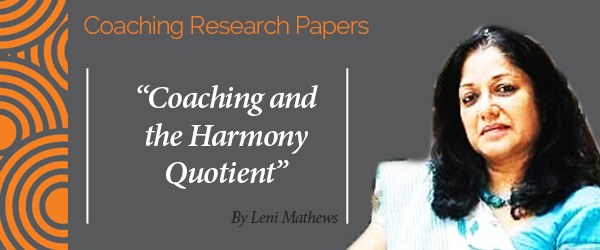A Research Paper created by Leni Mathews
(Executive Coaching, INDIA)
Today, we are all familiar with the terms IQ ie. Intelligence Quotient and EQ ie Emotional Quotient. In the past, it was the IQ profiling assessments that recruiters were interested in. Today, we are also aware of the significance of EQ that primarily deals with “emotional intelligence” and hence many recruiters today, use behavioral profile assessment tools that uncover the emotional intelligence of candidates for specific roles especially those that require people management skills.
It is very important to understand that emotional intelligence is not the opposite of intelligence. It is not the triumph of the heart over head – it is the unique intersection of both. David Caruso
The good news is that though there is not much we can do with IQ development, we can develop our EQ significantly. As all HRD /people development professionals understand that as you get to leadership roles, it is not the technical skills that are critical but the ability to lead and manage teams that become a critical competence requirement. It is your ability to shift from being an ‘individual contributor” to an “organizational capability building contributor” that is at play. Your role no longer deals with individual frontline delivery, but your role is to get your teams to deliver at optimal performance. People orientation; relationship orientation and people management therefore become key behavioral indicators for leadership competence. Hence the significance of working with “emotional intelligence” especially for leadership roles becomes obvious. So ways of developing the usage of emotional intelligence, brings us to the significance and potential of “Coaching and the Harmony Quotient”.
Then said a teacher, speak to us of Teaching. And he said: No man can reveal to you ought but that which already lies half asleep in the dawning of your knowledge. The teacher who walks in the shadow of the temple, among his followers, gives not of his wisdom, but rather of his faith and lovingness. If he is indeed wise he does not bid you enter the house of his wisdom, but rather leads you to the threshold of your own mind. Khalil Gibran, quote from “The Prophet”
The philosophy, approach and process of coaching is grounded in this essence. What Khalil Gibran called “Teaching” in those days, could very well be what we call “Coaching” today. It is also what differentiates coaching from mentoring, consulting or prescriptive training.
It is said that the left side brain functioning deals with the “Rational and Conscious Mind”, while the right side brain functioning deals with the “Emotional and Subconscious Mind”. The rational and conscious mind functioning is what is determined by “IQ” while the emotional and subconscious mind functioning determines ones “EQ” or emotional intelligence.
